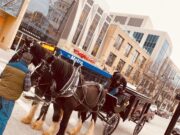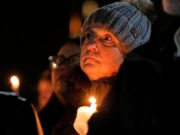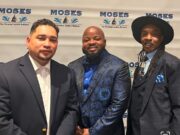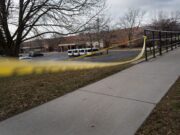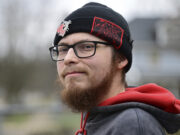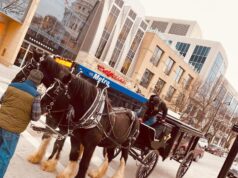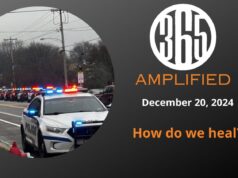Terrier mix dog for his final walk of the day. Earlier that evening, my wife
made a nice dinner, we went to a movie, and planned to go to bed early in
anticipation of a busy Christmas holiday weekend. In the last stretch of my
dog walk, just 300 feet from my front door, a vehicle pulled up and parked
along the sidewalk. A male yelled at me from the back seat, “F*ck you,
n*gger and your little Chihuahua dog.” I ignored him
and kept walking. From behind me I heard the car door open, I turned around
to see, through the headlights, the silhouette of a young man, slightly
shorter and much thinner than me, walking toward me. He was now yelling,
“Yeah, I said it; f*ck you n*gger, and your little dog.” My mind flashed to
the opening scene of the movie, “Get Out.”From the passenger seat, a female giggled and said, “I think your little dog
is cute,” so I knew there was more than one person in the car but had no
idea how many. As my dog barked and tangled his leash around my legs I said
to the guy, “Look, man, you have obviously been drinking. Don’t start
anything. I could break you down and toss you up into those woods.” It was
my first warning to him, but he continued walking towards me, calling me
names, and eventually pushed me in my chest. I sent out my
second warning-a right hook that did not connect but had the effect I
wanted; he stepped back. That is when the driver’s door opened and a much
larger man, began sprinting toward me, low like a football linebacker
looking to tackle me. But, the momentum he built up worked against him as my
fist connected squarely with his face. We both fell backward to the ground.
I next to my barking dog and he with a bloody, broken nose went to his
knees. The first male continued to yell obscenities at me. The female was
now out of the car and screaming. The second male, with the broken nose, was
on the ground crying. I was dialing 911.
That night, two white males, a 23-year-old and 30-year-old, attacked me, a
51-year-old black man who first came to UW-Madison in 1985 to play
basketball and earn a college degree. I have traveled to 32 countries,
living in Asia and Europe for 9 years before returning to the USA, where I
have lived in Chicago, San Diego, and Miami. I eventually settled in Madison
to work, raise a family, and earn my MBA from UW. Yes, at points in my life
I had been called the “N Word”, but until this night, I had never been
called that and then attacked by angry strangers.
had a lot of questions swirling through my head. Who were these people and
what made them do this? How did that happen so close to my home and in my
neighborhood? How “normal” was this in Madison? Is this evidence of the
“Trump effect” on our nation?
More than two hours after the Friday incident, three police officers finally
arrived with more questions for me. My excitement to see them quickly turned
to anxiousness as I repeated and clarified my story several times to all
three officers before they told me the male with the broken nose was at the
hospital but would be fine and the male who started it all was at home in
his apartment just down the street. They were heading to his apartment to
arrest him for disorderly conduct with a hate crime enhancer. He was going
immediately to jail.
But it appeared that he did not go to jail. Using the victim’s rights
information the police left behind, I called the Dane County jail that night
and most of the next day and checked the website. No record of him was
found. When a District Attorney representative called me on Tuesday, I
learned he had bailed out that night. The DA was recommending that he go
through the Dane County Community Restorative Court program so that he has
to face his victim and take responsibility for his crime. Because he was a
young college graduate (Purdue) with no prior record, his charges might be
dismissed with no real punishment and no chance of reflection if he went
through standard court proceedings. I agreed that this plan could work if
they added an alcohol program to his requirements as well as the stipulation
that if he ever did anything like this in the future, this crime would go on
his record. The DA agreed.
Almost a month later, I did not know what was happening with this matter.
There was no record on CCAP and I had to formally ask and pay for a police
report, which did not exist yet. When I finally received the police report,
I was shocked to find several inaccuracies about what happened, along with
lies and expressed anger from my attackers. The most horrifying was that my
attackers told the police that night that “a black man attacked them.” No
wonder the police showed up at my home that night acting like they were
going to arrest me. The responding police officer stated in the police
report that the two males were “extremely intoxicated” and that she found a
knife in the pocket of the first
attacker. One redeeming fact the police report provided was that these three
people are not from Madison but from Terre Haute and Muncie, Indiana.
After reading the police report, I began to wonder, what are my rights? It
seems that if I wanted justice for being assaulted, I needed to have been
beaten and injured too. But, two guys out for a night of drinking were wrong
when they thought they could take on a lone black man out walking his little
dog. But what if it had not been me, a guy not afraid and capable of
defending himself? What if it had been my elderly neighbor, a black man who
lives just 150 feet from where this incident took place. What if it had been
the twelve-year-old black boy who lives just one block over? Why does a
person need to be black, attacked and beaten for it to be called a criminal
assault and not just a disorderly conduct with a hate crime enhancer? In
2018, the punishment for repeatedly calling a person a hateful, racial slur
and attacking that person should be more than having to explain a broken
nose at the family Christmas gathering or spending an hour or two in jail.
The costs should be more than just hiding the incident from your employer
when you take vacation days to attend a hearing and some court-ordered
programs. For me, this disorderly conduct with a hate crime enhancer charge
needs to be elevated from a misdemeanor to a larger criminal offense. Then
offenders would think hard and long about the more serious consequences
before offending someone because they do not look like themselves.
That is why I want my perpetrators’ names, Austin Bossaer, Jordan Michael
Volz, and Gretchen K. Marshall, on the Google search engine. To Austin, I
wanted to say that I am a believer in second chances, but you cannot be
redeemed when your actions are concealed. Go through the CRC program and
make the most of it. You are more than your criminal actions and your poor
relationship with alcohol.
After meeting Austin a few weeks ago at the CRC program, that encounter
helped to provide some context and perspective as to why this incident
occurred and why it happened to me. Sure, this could have happened to anyone
and could have occurred in any neighbor in Madison. But, this incident had a
unique element that explains why this happened to me. To these people I was
a complete stranger and they targeted me because I am black. However, if I
was white, I feel that these men would not have confronted me and then
attempt to assault me. I am not going to stop being black tomorrow or next
week, or ever. I am determined to not let this incident change me from being
a caring person. Therefore, I forgive them and I hope that this incident
changes my perpetrator(s) and that it challenges him to take a closer look
at his prejudices and triggers his journey to become a more tolerant person.
My name is Trent Jackson and I am the Senior Director of Development for the
Division of Diversity, Equity, and Educational Achievement, a Chancellor’s
initiative, at the UW Foundation.

